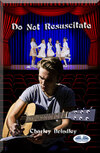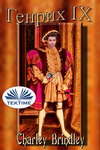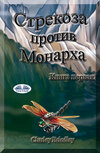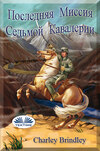Loe raamatut: «Do Not Resuscitate»
Do Not Resuscitate
by
Charley Brindley
charleybrindley@yahoo.com
https://www.charleybrindley.com/
Edited by
Karen Boston
https://bit.ly/2rJDq3f
Cover by
Charley Brindley
© 2019 by Charley Brindley all rights reserved
Printed in the United States of America
First Edition November 2019
This book is dedicated to
Vern F. Brindley Jr
Some of Charley Brindley’s books
have been translated into:
Italian
Spanish
Portuguese
French
and
Russian
Other books by Charley Brindley
1. Oxana’s Pit
2. Raji Book One: Octavia Pompeii
3. Raji Book Two: The Academy
4. Raji Book Three: Dire Kawa
5. Raji Book Four: The House of the West Wind
6. Hannibal’s Elephant Girl Book One: Tin Tin Ban Sunia
7. Hannibal’s Elephant Girl Book Two: Voyage to Iberia
8. Cian
9. Ariion XXIII
10. The Last Seat on the Hindenburg
11. Dragonfly vs Monarch: Book One
12. Dragonfly vs Monarch: Book Two
13. The Sea of Tranquility 2.0 Book One: Exploration
14. The Sea of Tranquility 2.0 Book Two: Invasion
15. The Sea of Tranquility 2.0 Book Three: The Sand
Vipers
16. The Sea of Tranquility 2.0 Book Four: The Republic
17. Sea of Sorrows
18. The Last Mission of the Seventh Cavalry
19. Henry IX
20. Qubit’s Incubator
21. Casper’s Game
22. The Rod of God
Coming Soon
23. Dragonfly vs Monarch: Book Three
24. The Journey to Valdacia
25. Still Waters Run Deep
26. Ms Machiavelli
27. Ariion XXIX
28. The Last Mission of the Seventh Cavalry Book 2
29. Hannibal’s Elephant Girl, Book Three
See the end of the book for details about the other books
Chapter One
March 23, 2019
I brushed my hand down my face, trying to wipe away the fog that shrouded my mind. As I did, my fingers caught on something stuck in my nose.
What the hell? Where am I?
The tube felt like it was halfway down my throat. I tried to pull it out, but it was taped to my face. My brain was stiff, drifting away. I tried to concentrate.
Still nothing but muddled images. Not a thing I can lock onto. Eyes open, but hazy view of…what? Inside of a cloud. Lots of white stuff and shiny metal. Tubes. Beeping noise.
Hospital. Oh, yeah. That doctor who looked like she was about twelve years old. Way too grim for a kid.
I felt as if I’d been crushed and reconstituted into a piece of crap. Not much pain; just a mind full of wet cement.
They’ve got me doped up on painkillers.
Just as well.
Hope they remember, ‘Do Not Resuscitate.’ I don’t want to hang onto a life of tubes, respirators, and beeping monitors.
A soft, rustling sound.
Man in blue, pretty powder blue. Another doctor? Good, not a teenager. Please don’t give me any bullshit about a few more years of so-called life. I’m almost eighty. A few more years of misery and hardships for Caitlion isn’t what I want. Just snip these tubes and let me go.
The man in blue pulled a chair to the side of my bed, sat, and smiled.
Not taking vitals, not looking sternly at monitors, no stethoscope draped around his neck, not shoving needles into me; just smiling. Big guy, maybe 6-3, lean, light beard, brown hair, blue eyes, dark blue, like that first shade of night.
“What are you so…” Ugh, dry throat. I swallowed. “Chipper about?”
“It’s almost time.”
His voice was smooth, not as masculine as I expected. It was more like Mom’s voice, from when I was a kid. Soft, pleasant, making me feel like everything would be all right.
Another sound. The door swishing open. I turned my head on the pillow to see the nurse.
She checked the monitors. I wondered why the doctor had no interest in the readings.
She tapped a red fingernail on a digital display, then smiled at me, ignoring the doctor.
I tried to return her pleasantness. She was pretty and young, twenty-something. Her complexion was like the soft brown of summer wheat.
“You doing okay, Mr. Brindley?”
I nodded.
“They’re going to bring you some nice mush and prune juice. Then the doctor will be in to talk to you.”
When I tried to raise my right hand to point to the doctor sitting beside me, it was weighted down by a tube and two needles inserted into the back of my hand.
She was gone before I could say anything.
“You should probably ask to see your family,” the doctor said.
“That bad, huh?”
He nodded. “We have to get started.”
“If I know my great-granddaughter, she’s around here somewhere.”
“Sleeping in a chair, out in the waiting room.”
“Can you get her?”
“No, you need to push your button.”
“Where is it?”
“Right beside your hand.”
“Oh, okay.”
I fumbled with the button, then pressed it. My nurse hurried in.
“What can I get for you, sweetie?” She put a soft hand on my shoulder. I liked her. She was kind, no nonsense.
“Is Caitlion out there?”
She nodded. “I expect so. She’s here more than I am.”
Poor kid. Is she going to be all right? I hope she’s prepared. I held on until she turned eighteen. I didn’t want other people making her decisions. It’d been just her and me since she was two, when her mom ran away with a trucker from Wichita. In a few weeks, Caitlion will be well-off. Alone, but she can go to university, or to Europe…whatever she wants to do. I know it will be a rough month or so.
“Papa.”
There she was, my beautiful girl, taking my hand and leaning down for a kiss on the cheek. Her name, Caitlion, like Kate Lion, came from her mother’s slurred speech when she was high on fentanyl and heroin. She was trying to say, “Tavion,” whatever that means.
“Hey, baby.”
She wore jeans with manufactured holes and a pink tee saying, ‘5 out of 4 people struggle with math.’
That made me smile.
“You’re looking good today,” she said.
Long auburn hair. Her brown eyes were deep, with a hint of mystery about them, as if they hid a special secret. She’d tinted the last six inches of her hair in a light honey blonde, in what I think she called babylights. And always, the beautiful smile.
I blew a puff of air past the tube in my nose and waved my hand, shooing away her words. “I think…this is it, sweetheart.”
“No, Papa. It’s not.” She took my hand, being careful of the IV.
Chapter Two
August 10, 1945
I slipped in through the door in the back of the classroom and took the only vacant seat.
“Who are you?”
It was my first day at Fordland High School. The squat little man in front of the class stood glaring at me. He was dressed in a dove gray suit, with a black vest and wide floral tie. I’d never seen a male teacher before.
“Ch-Charley Brindley.”
“Wonderful. Brindley boy number five. Are there any more of you?”
I didn’t know what he meant. Any more brothers, or any more Brindleys? I shook my head.
Why is everyone looking at me?
I heard a girl giggle. I slumped down, staring at the huge English textbook on my desk.
Can I just crawl under it and die?
“All right.” The teacher turned to the blackboard. “We’ll try to proceed without the benefit of your input.” He picked up a piece of chalk. “Mr. Winter Coldstream,” he said as he wrote his name on the board. “Yes, my mother had a great sense of humor.”
He dropped the chalk in the tray and dusted his hands. “Who can name the eight parts of speech?”
Six hands went up. All of them girls.
Mr. Coldstream looked around at the smiling girls. His eyes fell on me. “Brindley?”
No one had ever called me by my last name. I looked down and swallowed.
“Can you name them?”
I didn’t even know speech had parts. “Um…” I grabbed my textbook and flipped it open.
“You should have learned this in fourth grade.” He looked around the room. “You, what’s your name?”
“Ember Coldstream.”
“I thought you looked familiar. Name them.”
The others lowered their hands.
Ember smiled and named off the parts of speech.
She’s so cute, and smart, too.
“Very good, Ember.” He glanced around the room. “What’s an adjective?”
The same six girls raised their hands.
“Brindley?”
Oh, my God. Why does he keep asking me this stuff?
I stared at my open book, keeping quiet and not moving, hoping I’d disappear from the surface of the Earth. I felt my face flush, and I knew everyone was watching me, probably laughing to themselves about my stupidity.
“Well, I guess Brindley is so deep into mathematical calculations, his ears have blocked out all external stimuli.”
Several kids laughed, one boy louder than the others. I knew who he was.
Henry Witt. He probably doesn’t even know what stimuli is. I sure don’t.
“What’s your name?” the teacher asked another student.
“William Dermott.”
“All right, William. What’s an adjective?”
Why does he call me by my last name and everyone else by their first?
“Um…” William looked at his hands, the floor, the window. “Um…a person, place, or thing?”
“Wrong. Does anyone know the part of speech for a person, place, or thing?”
The same six girls again.
Mr. Coldstream strode across the front of the room and stopped before a girl with her hand in the air. “Who are you?”
“Juliet Dermott.” She lowered her hand.
“Really? Do you know Mr. William Dermott over there?”
“I wish I didn’t.” She glared at William.
“Can you answer the question, Juliet?”
“Noun.”
She’s pretty, and smart, like Ember.
“Correct. What are most words ending in ‘-ly’ known as?”
Please don’t ask me again. I don’t know any of this stuff.
“Adverbs,” Juliet said.
“Right.”
I never knew time could pass so slowly. Hey, I did an adverb.
“Let’s talk about diagramming a sentence, shall we?” Mr. Coldstream wrote on the board, ‘The quick brown fox jumps over the lazy dog.’
Diagramming? That’s about a fox and a dog.
The fifty-five minutes in Mr. Coldstream’s ninth grade English class seemed like fifty-five hours. The ringing of the bell was music to my ears. I grabbed my book and hurried out into the hall.
“Hey, Clod Hopper.”
I turned to see a tall boy leaning against the wall. He had red hair and about a thousand freckles.
“What are you doing here?”
Another boy and two girls were with him. They stared at me, waiting for me to say something.
“Going to history class.”
“No, what are you doing in high school?”
I didn’t know what he meant. I shrugged.
“You’re supposed to go to junior high first.”
The one-room school I came from had grades one through eight, but no junior high. “Oh.”
“What an idiot,” the other boy said. It was Henry Witt.
“He doesn’t even know what junior high is,” Ember said.
All of them laughed at me.
“Love your overalls,” Ember said, then giggled.
I turned, wanting to run from the building and go home, but I forced myself to walk away slowly.
I’ve got to find my history class.
I walked down the hall, then turned back.
I must have missed it.
I heard some girls singing. “Pee wadley Pasty, huge big fatsy.”
Turning a corner in the hallway, I saw a group of four girls facing an overweight girl.
“Pee wadley Pasty, huge big fatsy,” they sang, then laughed at the big girl as tears streamed down her cheeks.
The poor girl was backed up against her locker, with no place to go. Her sky-blue eyes were clouded with tears. She wiped her face on her sleeve and turned to lean her head against the locker. Her long blonde hair curled down over her shoulders. She was big, probably over 250 pounds, but why did they tease her?
Other students walked by, some laughing or making mean remarks as they went on their way. I felt as if I should say or do something, but one of those girls was Ember Coldstream. I didn’t want her to remind everyone of my humiliation in English class.
Apparently tiring of their torturing of Patsy, the four girls went on their way, still singing their silly ditty. After they left, Patsy opened her locker and found a handkerchief.
What can I say to the girl? I feel sorry for her, but I’m such a klutz. I’d probably just say something stupid.
Patsy watched the four girls go into a classroom, then she took some books from her locker. I hesitated, but when she turned and saw me standing there, I hurried away, looking for the history classroom.
* * * * *
The lunch hour was an even worse experience.
“What’s that smell?” said a boy at the next table.
“Cow shit,” said another.
“Where’s it coming from?”
“Oh, look, it’s the plow boy.”
“What are you doing in here, Clod Hopper?”
I looked down at the egg sandwich Mom had made for me.
“I think he’s eating a cow shit sandwich.”
The other boys laughed, drawing attention from the next table.
“I thought brown-baggers were supposed to eat outside?”
“Yep, that’s the rule.”
“Probably when he learns the parts of speech,” a girl said, “he’ll be able to read the rulebook.”
I knew who it was without looking—Ember.
“Didn’t they make a rule book with pictures,” she said, “so the farmers can figure out the regulations?”
That got her a round of laughter.
“Yeah,” a boy said, “a coloring book.”
I rolled the rest of my sandwich in the paper bag and grabbed my thermos of milk.
“Oh, no. He’s about to cry.”
They boo-hooed and tossed off more smart remarks as I hurried from the cafeteria.
I couldn’t get away fast enough, and I sure wasn’t hungry anymore.
That’s the last time I’ll go there for lunch. Is there really a rule about not taking your lunch into the cafeteria? Maybe if I eat there, I have to buy my lunch. If I had lunch money, I would. Tomorrow, I’ll go outside at lunchtime to see if anyone else brings their lunch from home.
* * * * *
“Mom, I don’t want to go to school.”
It was the morning after my first day of high school.
“Why?” She worked on my sandwich for lunch.
“Everyone hates me.”
“I don’t think they hate you.”
“They picked on me all day, even at lunch.”
“Did you tell them to leave you alone?”
I shook my head and took a bite of Post Toasties and milk, then added another teaspoon of sugar.
“When they say something mean to you, say something back.”
“But I can never think of anything until it’s all over. After they laugh and walk away, then I think of a comeback.”
“Well, you have to think faster.”
Yeah, good idea, Mom. But my brain is too slow for that.
“How about if I just punch them in the face? Except for the girls.”
“The girls are mean, too?”
“Yes.”
There’s no way I’m gonna talk to a girl. Or punch one, although I’d rather do that than talk to them.
“Where are you when they pick on you?”
“In the hallway, and at lunchtime in the cafeteria.”
“Okay, when a class ends, stay in the classroom until just a minute before the next class, then hurry to the next one before they have time to say anything. And find a quiet place to eat lunch. You don’t have to go to the cafeteria for lunch.”
“Good idea, Mom.”
I took my lunch sack and ran to catch the school bus.
* * * * *
At lunchtime, I grabbed my sandwich from the locker and hurried outside, where I wandered around until I came to the football field. I climbed the steps and sat in the middle of the empty bleachers.
As I unwrapped my egg sandwich from the wax paper, I noticed someone across the field, in the middle of the other set of bleachers. From her size, I knew it was Patsy. I thought about going over to ask if I could eat with her, but someone sat beside her. It was a girl with metal braces on both legs.
I could see they were talking while they ate, so I decided not to intrude. Besides, I didn’t know how to intrude.
Do I just walk over and sit down? Or ask if I could sit with them? What if they say, ‘No?’ Then what? That would be embarrassing. Better to keep to myself.
After a quick lunch, I went to my science classroom a half-hour early and sat in the empty room, where it was quiet. Twenty-five minutes later, when the kids started coming in, I pretended to read my textbook.
“Wow,” one of the boys said, “he knows how to read.”
“Na, he’s got a comic book hidden inside his science book.”
They laughed.
I should say something. What’s a good comeback? “Yeah, I got Superman in here.” No, that’s stupid. “Sure, don’t you wish you had one in yours?” No, that requires an answer, and he’d have a smart remark, then I’d have to think of another one. My God, social life’s complicated. I’ll just keep quiet until they get tired of pestering me. How long’s that going to take? Probably the whole semester. Crap, three months of teasing, pestering, and wisecracks. I’ll never make it. How does Patsy do it?
Mrs. Adams’s history class had some of the same students from my English class.
I sat in the back, hoping no one would notice.
After the teacher wrote 330 BC on the blackboard, she asked, “Where did Alexander the Great come from?”
Several students raised their hands.
She went to stand in front of a girl. “What’s your name?”
“Ember Coldstream.”
“Can you answer the question?”
“I think Brindley knows. He’s an expert on ancient history.” She turned to grin at me.
What? Why is she doing this to me?
“Brindley,” Mrs. Adams said, “where did Alexander the Great come from?”
“Um…England?”
“No. Anyone?”
Juliet raised her hand. Mrs. Adams nodded to her.
“Macedonia.”
“Right. And what empire was the first to be conquered by him?”
“Greece.”
“Right again. Good work. I’m glad someone’s been reading during summer vacation. Now, let’s talk about the Roman Empire.”
Before the class was over, she assigned us the first three chapters to read before the next day’s class.
* * * * *
Algebra was just as hard as English and history.
Why didn’t Mrs. Caldwell teach us some of this stuff?
“Buenas tardes estudiantes,” (Good afternoon, students) Mrs. Sandoval said at the beginning of Spanish class.
Several kids responded, “Buenas tardes, Señora Sandoval.”
“Es un hermoso día,” (It’s a beautiful day) Ember said.
I sat in the back of the room, staying very still. I had no idea what Ember had said, but it brought a smile to the teacher’s face.She then looked my way, and I sank down, knowing what was coming.
“Como te llamas, joven?” (What’s your name, young man?)
I only knew by her tone of voice that she’d asked a question. I shook my head.
“I asked your name.”
“Oh, Charley Brindley.”
“El tiene un ligero problema mental,” (He has a slight mental problem) Ember said.
A few of the students giggled.
I only knew it was something about a mental problem; I could guess the rest.
“Oh, siento mucho escuchar eso,” (Oh, I’m so sorry to hear that) Mrs. Sandoval said. “We’ll start off slow for your benefit.”
Ember’s smile looked very much like a sneer.
Why does she hate me?
I opened my textbook and held it up in front of my face.
* * * * *
After school, I stood on the sidewalk, waiting for the school bus.
“Back of the line, Clod Hopper.”
“What?” It was the freckle-faced Crammer.
“You’re standing in my spot. Get to the back of the line, where you belong.”
“There’s no line.”
“There will be, and you’re in my spot.”
He shoved me backwards, knocking my books to the ground.
Some other kids came to watch.
I lunged for him, grabbing him around the waist.
Crammer brought up his knee, hitting me in the stomach.
When I swung at him, he hit me in the chest, knocking me down.
The others laughed. “Go get him, Brindley.”
I jumped up and swung my right fist.
He turned his shoulder toward me.
My fist hit solid muscle.
He punched me in the face, and I went down. I got to my knees, rubbing my eye.
The bus pulled up, and everyone filed on, laughing at me as they passed me. I was last to board. I dropped into a seat behind the driver.
* * * * *
After a month in school, I’d learned nothing, except for the best places to hide at lunchtime and to keep quiet in class. The teachers finally quit asking me questions, since I could never answer anything correctly.
It was the same in all six subjects. I sat in the back and just tried not to be noticed. I took notes and read my assignments, but I was just too slow. Most of the other kids participated in class, always ready to show off their knowledge, particularly the girls – and especially Ember. I guess because her father was a teacher.
* * * * *
I left English, hurrying toward my history class.
“Hay Seed.”
I turned to see Crammer coming toward me, followed closely by his gang of three.
Oh, no. Not again.
“What?”
“You wear those same overalls every day?”
I looked down at myself. Actually, I had four pair. Mom washed clothes three times a week. We had a wringer washing machine on the back porch. Dad and my uncle Leo had rigged up an old electric motor they’d salvaged from a junk yard, to rotate the drum paddle. But all my overalls did look alike.
“And the same flour sack shirt?” he asked.
“Yeah, I-I guess so.”
“Tell your old lady to use a burlap bag next time. That’s more your style.”
He turned to grin at his pals. They laughed. He looked back at me, waiting, I guess, for a response.
I didn’t have one.
Tasuta katkend on lõppenud.




















